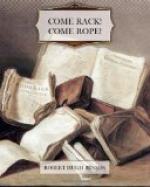One thing more, too, had moved him this morning; and that, the sight of the young priest at the altar whom he had met on the moor. Here, more than ever, was the gentle priestliness and innocency apparent. He stood there in his red vestments; he moved this way and that; he made his gestures; he spoke in undertones, lit only by the pair of wax-candles, more Levitical than ever in such a guise, yet more unsuited than ever to such exterior circumstances. Surely this man should say mass for ever; yet surely never again ride over the moors to do it, amidst enemies. He was of the strong castle and the chamber, not of the tent and the battle.... And yet it was of such soldiers as these, as well as of the sturdy and the strong, that Christ’s army was made.
* * * * *
It was in broad daylight, though under a weeping sky, that Robin rode into the court at Matstead. He shook the rain from his cloak within the screens, and stamped to get the mud away; and, as he lifted his hat to shake it, his father came in from the pleasaunce.
Robin glanced up at him, swift and shy, half smiling, expecting a word or a look. His father must surely have read his little letter by now, and forgiven him. But the smile died away again, as he met the old man’s eyes; they were as hard as steel; his clean-shaven lips were set like a trap, and, though he looked at his son, it seemed that he did not see him. He passed through the screens and went down the steps into the court.
The boy’s heart began to beat so as near to sicken him after his long fast and his ride. He told himself that his father could not have been into the parlour yet, though he knew, even while he thought it, that this was false comfort. He stood there an instant, waiting; hoping that even now his father would call to him; but the strong figure passed resolutely on out of sight.
Then the boy went into the hall, and swiftly through it. There on the desk in the window lay the pen he had flung down last night, but no more; the letter was gone; and, as he turned away, he saw lying among the wood-ashes of the cold stove a little crumpled ball. He stooped and drew it out. It was his letter, tossed there after the reading; his father had not taken the pains to keep it safe, nor even to destroy it.
CHAPTER IV
I
The company was already assembled both within and without Padley, when Robin rode up from the riverside, on a fine, windy morning, for the sport of the day. Perhaps a dozen horses stood tethered at the entrance to the little court, with a man or two to look after them, for the greater part of their riders were already within; and a continual coming and going of lads with dogs; falconers each with his cadge, or three-sided frame on which sat the hawks; a barking of hounds, a screaming of birds, a clatter of voices and footsteps in the court—all this showed that the boy was none too early. A man stepped forward to take his mare and his hawks; and Robin slipped from his saddle and went in.




